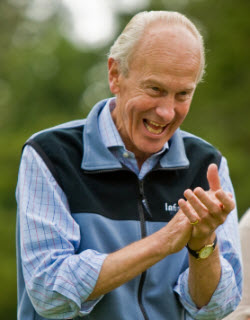3 November 2010
WorldSkills Competition reminiscences

By Charles Turner, Honorary Member, United Kingdom
The United Kingdom (UK) hosted the ‘Skill Olympics’, as it was then called, in Birmingham in 1989. The following year, with a small Government grant, UK Skills was established, the first professional organisation dedicated to the promotion of national skills competitions and the selection, preparation and entry of a UK team for the Skill Olympics.
In 1992, I was looking for a second career and saw an advertisement for a post as UK Team Co-ordinator. Like the majority, I had never heard of the Skill Olympics. Over the next 16 years I learnt a great deal about it and was involved chiefly in the role of supporting the UK entry for the WorldSkills Competition, since when, in semi-retirement, I initially acted in more of an advisory role for WorldSkills London 2011, but now primarily to UK Skills. I remember so many good times, highlights and changes over the years and have recalled a few.
My first reaction to experiencing an international competition was similar to that of many others in that I was overwhelmed by its impact and size. This was during the WorldSkills Competition (WSC) in Taipei in 1993, since then, the WorldSkills Membership and number of Competitor entries has almost trebled. I was also immediately struck by the friendliness and camaraderie of the ‘WorldSkills family’. The WSC in Lyon, France in 1995 was particularly notable for initiatives to promote the Competition to a wider audience. One incident that particularly amused me was, on passing McDonald’s, seeing the UK Expert for Cooking celebrating his Competitor’s gold medal by sampling a burger.
WorldSkills St. Gallen 1997 had the particular advantages of a small city and the friendliness of all. The excursion for everyone was to the Jungfraujoch and, in spite of the very lengthy journey, well worth it. In 1999, the venue for the WSC in Montréal, the Olympic stadium, was a dramatic setting. In the role as Team Leader for once, I shared the intense frustration of Competitors waiting for what seemed ages to enter the Opening Ceremony and then the powerful impact of the Ceremony itself. Winter arrived suddenly as the Competition ended, and I remember walking through the snow to the Closing Ceremony.
WorldSkills Seoul 2001 provided another great but different venue. Perhaps the abiding memory was the shock of hearing of the horrors of 9/11 during the night before the Opening Ceremony and the way that everything went ahead as planned. For WorldSkills St. Gallen 2003, we returned to Switzerland at the same venue as in 1997. Knowing that the WSC1997 Organising Committee would again be managing the event, we had every confidence that it would be a great success and so it proved, although the particularly hot weather took everyone by surprise.
In the build-up towards WorldSkills Helsinki 2005, I found myself more closely involved in the work of the WorldSkills Secretariat and the Technical Committee, which impressed upon me just how many people give so much of their time, so willingly, to ensure the success of every Competition. The Finnish Competition demonstrated how hosting the WorldSkills Competition could provide a potent national legacy.
WorldSkills Shizuoka 2007, with its regular stunning views of a snowy Mount Fuji in a blue sky and a unique Competition site, much of a temporary construction, also saw the first Competitors’ Village, a great development repeated in Calgary for the WSC2009, another Competition again blessed with blue skies, with trips to the Rockies and the experience of Wild West culture.
So, WorldSkills London 2011 approaches. Having seen a little of what is involved in the organisation of such an increasingly complex event, I was initially horrified when it was suggested that the UK bid for the Competition, but I quickly became aware of the strength of the bid. Thereafter, I found myself visiting individual Member countries/regions to reassure them of the strength of that bid. Much of course remains to be done over the next year but I have every confidence that our Organising Committee will deliver a wonderful event. From the beginning, we have emphasised our aim of bringing WorldSkills, in general, to a much wider audience and I am sure that this will be the case.
My involvement with the WorldSkills movement has been comparatively brief but, in that time, there has been a great deal of change and very positive developments. For my first few years, there was no email communication, allowing little international interaction between Competitions. Inevitably, standards have improved from one Competition to the next. I know that UK teams have been better prepared for each successive Competition as have other teams, resulting in higher standards each time. Experts have generally played a more professional role in the organisation and management of the skill competitions. As we know, each WorldSkills Competition has succeeded its predecessor as the best ever but it is only in very recent times that the Competition organisers have had the detailed support and advice from preceding organisers and an increasingly dedicated, professional and experienced WorldSkills Secretariat.
Yet some things never change, particularly the atmosphere of friendliness and enthusiasm, as a result of which I, like many, find myself unable to walk away from being involved.